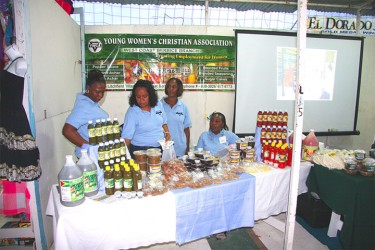For the past three years the ladies of the West Coast Berbice Branch of the Young Women’s Christian Association (YWCA) have been crossing the Berbice River to attend the annual Berbice Expo.
Their journey, they say, is aimed at providing continual exposure for their products to a market which exceeds the size of that in their immediate community in Lichfield.
In 2008, they launched their micro enterprise, a cottage industry pursuit comprising the preservation of fruit, herbs and spices to manufacture common condiments like pepper sauces, achars and assorted food seasonings. To that they added the creation of sweetmeats like fudge, sugar cake and tamarind balls.

It was an initiative that sought to respond to the high level of unemployment among the young women, many of them single parents, in the community. The pursuit also created a modest market for the community’s farmers. The women would need farm produce for their agro-processing pursuits.
President of the organisation Paula Marks is proudest of the fact that the group has been able to provide practical responses to some of the challenges which the women in the community face. Several single mothers, having been trained by the organisation are now enjoying useful income subsidies on account of that training.
In 2003, several young women from the West Coast Berbice area who were participating in a Child Care programme at the Lichfield Primary School chose to visit the YWCA Day Care Centre in Georgetown. The visit over, they decided to duplicate the Georgetown Day Care project at Lichfield.
Once the Day Care facility was set up the entrepreneurial group was ideally positioned to provide courses in catering, cake decoration, garment manufacturing and handicraft.
Over time, the Lichfield women have grown, their venture coming to be seen in the community as an example of creating enterprise out of necessity. Their production pursuits apart, the Lichfield YWCA project has blossomed into a training ground for young women. Those who come, then go, invariably leave with a capacity to create their own enterprises. What remains behind continues to consolidate itself.
The association’s vice-president is preoccupied with consolidating the commercial potential of the group’s multi-mix products. She appears acutely aware that the capacity to manufacture products that may be in demand amounts to only half the job. Running a business is about managing an enterprise. That includes planning, budgeting, packaging and marketing, all requisites, the absence of which causes many well-intentioned enterprisers to fail. That, indeed, has been the case in many instances in Guyana, a circumstance that has resulted on a renewed focus on teaching small business owners, particularly women, how to run a business.
The Lichfield YWCA has come a long way. Its products have attracted the attention of some supermarkets and shops in Berbice. There are also promises of space on the shelves of the Guyana Marketing Corporation’s shop in Georgetown. Mindful of the importance of meeting market requirements the group has its products subjected to tests by the Food and Drugs Department of the Ministry of Health. They have passed these tests.
The availability of products is seasonal, depending on the availability of fruit and cultivated seasonings. The group is anticipating a surfeit of pepper sauce in a season where pepper is plentiful. The group must hasten to purchase pepper in bulk at prevailing low prices before prices soar again then proceed quickly to the manufacture of pepper sauce before the pepper begins to rot. Part of its short-term plan is to enter into contracts with farmers for the purchase of pepper in order to secure price advantage and to guard against seasonal shortage.
Earlier this year, the organisation was the recipient of a $4.5 million grant from the Ministry of Agriculture’s Rural Enterprise Agricultural Development (READ) project, funded by the International Fund for Agricultural Development (IFAD) and administered by the Ministry of Agriculture. The monies were being used to effect renovation to the premises as recommended by the Food and Drugs Department. Part of the funding has been used to purchase a freezer, gas stove, an industrial blender and assorted kitchen utensils.
The group is currently awaiting a loan of $800,000 from READ to engage in the large-scale purchase of fruit and seasonings. After that, their bigger challenge will be to utilise that base to build a sustainable business enterprise. With other fledgling enterprises across the country awaiting support, the Lichfield YWCA group is only too well aware that its creeping phase is fast approaching an end and that it will soon have to stand on its own feet. It is in the area of understanding the orthodoxies of running a business that the group will still need help.





